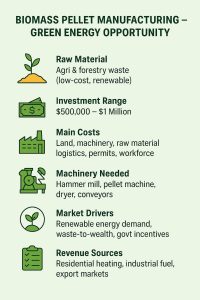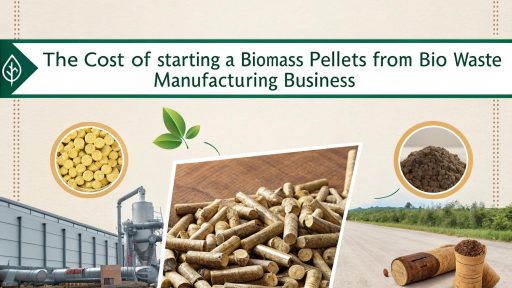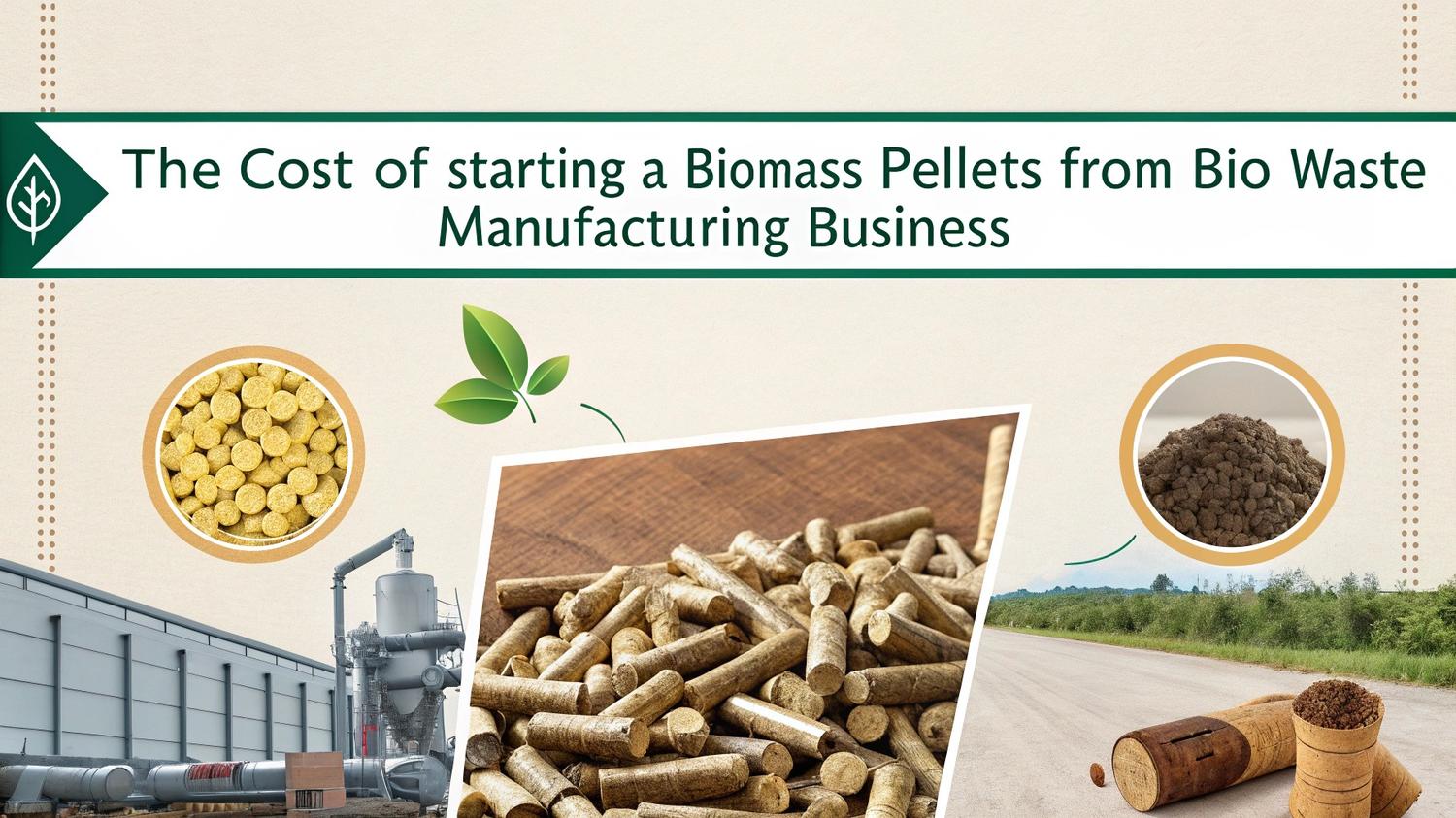Nowadays, the movement towards renewable and sustainable energy is very strong in our world, which cares about the environment. Biomass pellets, which are produced from bio-waste, show good potential as an alternative to conventional fossil fuels. They provide a renewable and environmentally friendly solution to meet the increasing demand. The industry of biomass pellets has been identified as one of the most profitable and impactful choices for entrepreneurs or startups interested in starting green businesses. Now, let us delve into the financial details and investment needed to initiate a biomass pellet manufacturing venture, along with how Niir Project Consultancy Services (NPCS) can support in this process.
Initial Investment Breakdown
- Cost: The main cost is for land and infrastructure, which includes buying a site and setting up the manufacturing facility. The amount of money needed can greatly differ based on location and size, but you should plan to allocate multiple hundred thousand dollars for this expense. This covers the cost of building or renting a factory, storage area, and office site.
- Machinery and Equipment: This is the essential part of biomass pellet production. You need machinery to process the bio-waste into small pellets. Important equipment includes hammer mills, pellet machines, dryers, and conveyors. Machinery cost is not fixed but varies depending on capacity and level of technology, starting from around $100,000 up to more than $500,000.
- Raw Materials: Luckily, the main raw materials for biomass pellets are not too costly because they often come from leftover items in agriculture or forestry. Even so, there will still be expenses for gathering and moving these materials as well as putting them into storage.
- Licenses and Permits: Regulatory conformity is very important in a business that affects the environment. The price for permits and licenses can change, depending on the rules set by local or national governments.
- Workforce: For machinery operations, logistics management, and day-to-day operations of the business, a skilled or unskilled workforce is necessary. Wage expenses will be determined by the size of these activities as well as labor market conditions in that area.
- Utilities and Overheads: Ongoing expenses for utilities like electricity, water, heating, and general overheads such as insurance, equipment maintenance, etc., should be thought about.
Related Article:- How to Start a Biomass Pellets from Bio Waste Manufacturing Business?
Total Startup Cost
Normally, the total amount required to commence a biomass pellet making enterprise might fall between $500,000 $1 million. This estimation is an overall range; for getting precise figures, it necessitates conducting thorough market and feasibility investigations that could differ based on factors like plant capacity, site selection, as well as technology used, among others.
Why Enter the Biomass Pellet Industry?
Sustainability and Demand: The worldwide push for renewable energy is foreseen to increase the need for biomass pellets, particularly in areas that greatly depend on coal and oil.
Government Assistance: Governments often provide financial aid for renewable energy initiatives. This support may come in the form of subsidies, tax advantages, or grants that can noticeably lessen the initial and ongoing expenses involved with setting up and running such projects.
Waste to Wealth: This business transforms waste from farming or forest activities, which otherwise would be dumped in garbage sites, into a valuable product. It matches with worldwide methods of lessening and handling waste.
Related Article:- Is biomass Pellets from Bio Waste profitable?
Launching Your Biomass Pellet Business: Practical Steps and Strategic Insights
The process of establishing a biomass pellet manufacturing business is not just about money; it also includes planning and getting ready in detail. The crucial steps to begin your biomass pellet business, with an emphasis on achieving maximum efficiency and profit, are:
- Market Study: First, thoroughly research the market for biomass pellets. Understand the demand, competition, pricing trends, and potential customers.
- Business Plan: Create a detailed business plan that covers operations, marketing strategy, financial projections, and required permits or licenses.
- Location Selection: Pick an appropriate location for your factory, considering logistic advantages like proximity to raw material sources and transportation facilities.
- Factory Setup: Arrange necessary equipment such as pellet mill machinery line, along with auxiliary systems like hammer mill or dryer system.
- Regulatory Compliance: Fulfill all legal requirements related to environmental protection laws and industry-specific standards
- Procurement of Raw Materials: Establish reliable channels for obtaining high-quality biomass feedstocks at reasonable prices
- Manufacturing Process Optimization: Continuously improve production methods to boost efficiency while maintaining product quality
- Product Quality Assurance – Implement strict quality control measures throughout the production process to deliver consistent, high-quality pellets
- Logistics Management – Devise an effective system for organizing the transport of both incoming raw materials as well as outgoing finished goods
- Partnership Building – Form strong relationships with suppliers, buyers, and other stakeholders in order to establish a stable network.
- Marketing Strategy Development – Craft innovative marketing strategies that attract customers from various sectors, including the residential heating market or industrial users sector, etc., towards using your products/services over those provided by competitors.
- Financial Management – Monitor expenses carefully while maximizing revenue generation through efficient resource utilization coupled with effective cost reduction methods.
View Our Project Report on:- Biomass Pellets from Bio Waste
Step-by-Step Guide to Starting Your Biomass Pellet Business

Market Research and Feasibility Study
Prior to investing a large sum of money, it is very important to comprehend the market changes. Investigating the need for biomass pellets in the markets you aim at, locating possible purchasers, and studying competitors are all part of this step. A thorough feasibility study is necessary to confirm the practicality of this project and direct your business plan.
Business Planning
Prepare a complete business plan that describes your business model, how you will operate, marketing plans, and financial forecasts. This document acts as the main guide for your business and is crucial when looking for investors or getting loans.
Technology and Equipment
The selection of technology and equipment is crucial for effective functioning of your plant. You should choose good-quality, long-lasting machinery that can handle the kind of bio-waste you intend to process. Additionally, consider the scalability of equipment to accommodate future growth.
Site Selection and Development
The place where you set up your manufacturing plant has a big effect on logistics and operational expenses. Choose a site that is easy to reach for raw material supplies and has good transportation connections for distributing the finished products. Ensure the site complies with local zoning and environmental regulations.
Read our Books Here:- The Complete Book on Biomass-Based Products
Licenses and Permits
Handle the complex rules by getting all required licenses for environment and business operations. You need to follow local, state, and national regulations carefully to prevent legal problems and keep your work going smoothly.
Staffing
Employ a capable workforce who can manage and operate the machinery, handle administrative duties, as well as maintain safety standards. Train your staff to improve efficiency and meet quality requirements.
Start of Operations
Now, you can start producing things. You must watch over the operations carefully during the first few months to make adjustments and guarantee control of quality. Establishing robust operational protocols from the start sets a solid foundation for your business.
Marketing and Sales
Plan a robust marketing strategy for creating brand recognition and drawing customers. Join trade fairs, use digital marketing methods, and connect with possible clients face to face. Establishing relationships with businesses such as power plants and industrial facilities that could benefit from biomass pellets for their operations may result in securing long-term agreements.
Watch YouTube Video:-
Conclusion
Initiating a biomass pellet manufacturing enterprise requires a significant financial commitment. Nevertheless, the chance for lucrative and enduring profits makes it an appealing business for entrepreneurs who concentrate on ecological impact. Utilizing NPCS’s comprehensive project reports and consultation aids, new businesses can handle the intricacies of initializing this company while maintaining conformity, effectiveness, and profitability.
For new companies that want to focus on producing biomass pellets, this field gives a good chance. The initial expenses are high, but the benefits in the long run from helping create environmentally friendly energy and entering into an expanding market could bring back significant returns. Working with an experienced consultancy such as NPCS can greatly improve your chances of success by giving you the knowledge and assistance necessary to thrive in this changing industry.
How NPCS Can Help You Start and Grow a Successful Business
Niir Project Consultancy Services (NPCS) is a trusted partner for entrepreneurs, startups, and small business owners across India. With decades of experience, NPCS provides in-depth support to turn innovative ideas into scalable businesses — especially in emerging sectors like agro-waste-based manufacturing, specialty chemicals, home-based businesses, and more.
 Market Research & Techno-Economic Feasibility Reports
Market Research & Techno-Economic Feasibility Reports
NPCS delivers comprehensive market research reports that include:
Industry trends and demand analysis
Legal and regulatory requirements
Raw material sourcing and local supply chain insights
Cost structure and value chain assessment
These reports help you validate your business idea and understand its viability in the real market.
FAQs
1. What are biomass pellets, and why are they important?
Biomass pellets are small, dense, and energy-rich fuel made from agricultural and forestry waste like sawdust, rice husk, and crop residues. They are important because they provide a renewable, eco-friendly alternative to fossil fuels, reduce carbon emissions, and help in effective waste management.
2. How much investment is required to start a biomass pellet manufacturing business?
The total investment to start a biomass pellet plant typically ranges between $500,000 and $1 million, depending on factors like plant capacity, location, machinery quality, and technology used. A detailed feasibility study can help in determining exact costs.
3. Is biomass pellet production profitable for startups?
Yes, biomass pellet production is a highly profitable green business. With rising global demand for renewable energy, government incentives, and the ability to convert waste into a valuable product, startups can achieve strong returns and long-term growth.
4. What raw materials are used to make biomass pellets?
Common raw materials include agricultural residues (rice husk, wheat straw, corn stalks), forestry waste (sawdust, wood chips, bark), and organic industrial by-products. These materials are usually low-cost and abundantly available, making production more cost-effective.
5. What licenses and permits are required for a biomass pellet plant?
You will need environmental clearances, factory operating licenses, and business registrations according to local, state, and national regulations. Compliance with pollution control norms is essential to operate legally and sustainably.




 Market Research & Techno-Economic Feasibility Reports
Market Research & Techno-Economic Feasibility Reports



Me bhi a business karna chata huu
Kindly Mail us in which field you want to start an industry. Write your requirements clearly so that we can provide details suited to you.